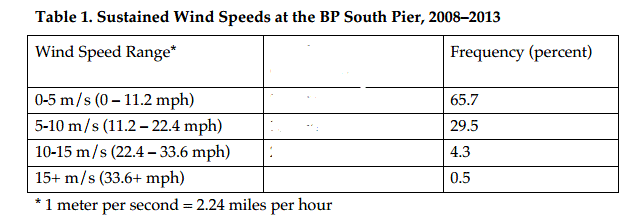A major issue is whether winds will lift coal dust from this facility and then distribute the coal particles into the natural and human-occupied environment. There is good reason for concern about this, with coal dust storms coming off the Canadian Westshore coal port when the wind picks up (see the image below). The Westshore coal export facility is just north of the border (see figure) in a location that is far less windy than the proposed Cherry Point/GPT site (more on this later).
Coal dust blowing from the Westshore coal terminal, British Columbia, April 2012. Photo: Jerry Bierens, Delta Optimist.
The proposed GPT site will include large hills of coal delivered by 10-20 coal trains per day. Will winds be sufficient to create coal dust storms as shown above?
To study the wind issue at the proposed Cherry Point site, UW undergraduate Ryan Clark and I have examined the nearby wind observations, with support from a local non-profit organization (Research Now). A summary of our findings can be accessed here, but I will summarize them in this blog.
We looked at roughly five years of 6 minute or hourly wind data, mainly at two sites: the south pier near the BP Oil Refinery and a land site near the BP storage facility. The former site is maintained by NOAA's National Ocean Service and the later by the Northwest Clean Air Agency. The proposed GPT coal pier is also shown on the map.
A nice way to summarize the winds at a location is something called a wind rose: one for the south pier is shown below. This plot shows the frequency of winds (in meters per second, multiple by roughly two to get knots) from various directions, with the shading indicating the frequency of various wind speeds. The inner circle indicates 2% of the time, the middle circle 4% of the time, etc. The most frequent strong winds at this site are from the south-southeast, but there are also many strong winds from the northeast. These are the winds blowing of the of the Fraser River valley, a major gap in the Cascades (see terrain map above). A secondary peak is from the northwest.
A key issue for the proposed coal terminal site is that it is at ground zero for the northeasterly winds coming out of the Fraser River Valley--the positioning could not be worse. And every few years there are extreme events, when the winds gust to 30-70 mph--which would play havoc with the coal piles. For example, an event in December 1990 brought winds exceeding 30 meters per second (60 knots) over the proposed coal terminal.
Want to see a video showing you what a strong SE blow in the Bellingham area can look like? Click on the image or the link:
So strong winds will either blow the coal dust out into the Strait of Georgia, polluting the waters, or send the particles toward Vancouver (in SE winds) or towards Bellingham (NW winds) to influence the human population. Blowing coal dust right over the prime habitat of the endangered southern resident killer whales, which are protected under both the Marine Mammal Protection Act and the Endangered Species Act.
And it is worse than that. The proposed facility will use water sprayers (misters) to keep down the dust. But the strong NE winds are virtually always accompanied by cold, below-freezing temperatures, which would freeze up the sprayers.
But there is more! The incessant coal train traffic will tie up road traffic in the Puget Sound region as the trains block crossings in Seattle, Edmonds, and Everett (among other locations), with an substantial economic cost that will more than negate the few permanent jobs this project creates. The coal ships and the trains coming and going will worsen regional air pollution, as will the combustion products produced in Asia when the coal is burnt--gases and particles that will waft their way across the Pacific back to us.
Heading our way
And the huge amount of coal burned as a result of this project will make a large contribution to global warming, outweighing everything done in our region to reduce our carbon footprint.
So how many ways can you spell environmental disaster? And for what? To help out Wyoming and Montana make some extra cash? Increase the profits from some foreign coal companies? We end up with profoundly negative impacts to our environment and economy and gain nothing in return. Global warming is substantially worsened. Our roads get tied up and our air quality declines.
Stopping this irrational project should be the goal of a bipartisan coalition in our state since nearly everyone will lose if it goes through. Bad for business, bad for the environment, bad for traffic, bad for health.




















No comments:
Post a Comment